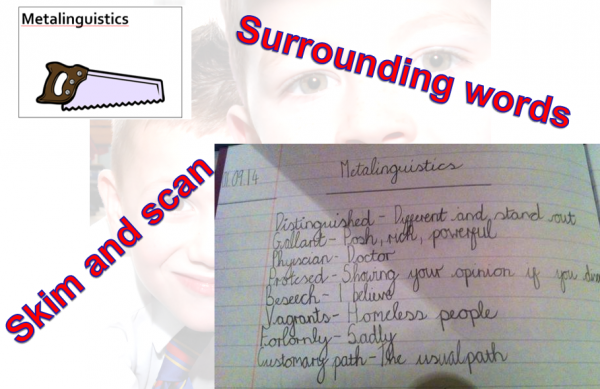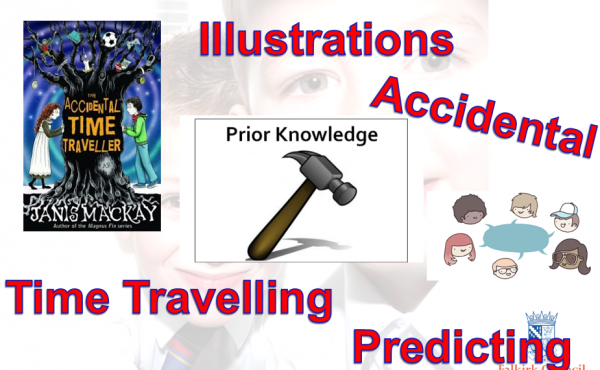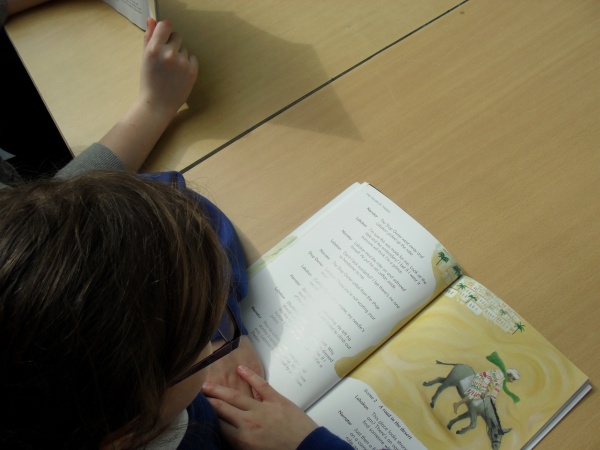 Bonnybridge Primary School have been working really hard to embed active literacy across their school. In this post, we are taking a look at how Bonnybridge are improving attainment in reading. In active literacy reading, there are 6 comprehension strategies which are:
Bonnybridge Primary School have been working really hard to embed active literacy across their school. In this post, we are taking a look at how Bonnybridge are improving attainment in reading. In active literacy reading, there are 6 comprehension strategies which are:
1. Prior knowledge and understanding – what do the pupils already know about the text/ main theme/ author
2. Metalinguistics – what are the interesting words and phrases? Which words do you like? Which words are you unsure of? How can we check the meaning?
Here the pupils are using a range of strategies, but you can see how they are analysing the words and phrases in this online newspaper report and using a dictionary to support their understanding. The pupils are using an active reading approach called ‘The Thinking Reader’ here:

3. Visualisation – can you produce a visual image in your head of the story/ plot/ character? Younger pupils will record this as a picture or drawing. Older children will produce more complex mind maps/ diagrams.
4. Inference – reading between the lines – what is the message the author is trying to convey without actually saying? What is the difference between what the character is thinking and what the character is saying?
Look at this wonderful work showing results of applying their inference skills about an advert #widertext

5. Main ideas – what are the main ideas relating to plot/ character/ setting/ themes? Here we can see the pupils from P6/7 of Bonnybridge Primary School using their knowledge of the main ideas to formulate a theory of their own.

http://www.youtube.com/watch?v=kFdMGginz4Y&feature=youtu.be
6. Summarising and paraphrasing – can you summarise the text in less than 20 words? Can you summarise in a tweet? Can you paraphrase the story? Can you provide synonyms and antonyms?
Look at these wonderful summaries of Danny, Champion of the World:

All of these 6 comprehension strategies combined are a very powerful toolkit for pupils who are then required to apply across a range of curricular areas in a range of new and unfamiliar situations.
Here is a quote from the Head Teacher commenting on the impact of active literacy across her school:
“A greater understanding and confidence by staff in delivering literacy across the school. Engagement of staff in the use of media to enhance learning and teaching is much more evident. This in turn has developed a deeper understanding for pupils of their learning.” – Jill Stocks, Headteacher
What does the DHT say about active literacy?
“This session, part of my remit is to develop Literacy and English across the school. We have worked hard as a staff to implement the principles behind Active Literacy. I find that reading has moved significantly away from ‘hearing reading’ to ‘teaching reading.’ At all stages in the school, the children are actively involved in their learning, working with the six comprehension strategies to gain a deeper knowledge and understanding of the texts that they are reading, watching or listening to. The use of Blooms Fans in the upper stages has encouraged deeper thinking and questioning of texts. A wide variety of learning contexts to which the children can apply their comprehension strategies has helped the children to transfer their reading skills across the curriculum. In addition to reading, writing has improved with the implementation of the genre specific targets in Taught Writing, Core Writing Targets in Taught Writing, Daily Writing and Writing Across The Curriculum jotters. Some classes have also introduced Personal Writing Targets where children are encouraged to set their own areas for improvement. The contexts for writing are relevant, purposeful, enjoyable and link directly to IDL themes where appropriate.” – Andrew Watson – DHT
Here is a quote from one of the class teachers:
“I have seen a vast improvement in Literacy over the past year. The implementation of spelling strategies have enabled the children to meet core targets within everyday literacy tasks. The children learn to spell actively which allows the words to come alive and while there is still very much a place for writing / spelling the words correctly, this has allowed the children to embed their learning,
The comprehension strategies are firmly implemented within all reading tasks. The children are fully aware of what each strategy is and how each strategy helps them to progress their learning and fully understand any text, whether it is a novel, film or a tweet. The children are more engaged with their literacy and are not only improving in literacy but are very much focussed on doing so.”- Michelle Cairns Class Teacher
“There has been a definite improvement in the literacy skills of the children over the past term. The children are much more engaged in their learning and I feel they have gained confidence in their own abilities. Over the past year the children have developed a more secure understanding of the 6 comprehension strategies and are much more confident using these independently. The inferencing skills in particular of the children in my class have improved and they are now more able to show a deeper understanding of the text as well as recognise and include inferencing within their own writing. My class really enjoy using a variety of texts such as film clips, articles etc and I feel that because of this the quality of discussion has significantly improved.” P6 Class teacher Emma Stanners
“Both myself and my class have learned a lot through active literacy this session. It has been a delight to provide a context for active learning and then to watch as the children take the initiative with their own learning.
The six comprehension strategies help to make reading more interesting for the children. They gain a deeper understanding of their texts and, consequently, enjoy it more. I have had parents come and tell me about how surprised they were that their child has suddenly developed an enthusiasm for reading at home and I believe active literacy played a huge role in this.
Similarly, I have been able to see many children develop and interest in their writing this session through active literacy. Much of our writing has linked to practical activities that we engage in prior to putting pencil to paper and so the children have been actively thinking about their task before even writing about it. As a result, they are eager to write.” Class teacher P6/7 Sarah Burns
What about the pupils? What do they have to say about active literacy? Here is a sample from P3K:
“Reading is different this year because we’ve got chapter books, with harder words. In Primary 2, we didn’t do inference, but now we do. I like reading because it’s quite fun and I like finding the clues. Inferencing is my favourite thing because we find everything” – Lucy MacFarlane P3K
“I like reading because it’s fun to do. I like doing summarising because it can be hard to find all the main points. It’s fun because you get to see good books like Boy Racer and you can read about who wins and who’s not good and who sticks up for them. It’s basically just fun!” – Zaak Budzinski
“I like reading because you get to learn loads of stuff from the books. I like doing main ideas. Sometimes it’s really hard, sometimes it’s really easy.” – Laura Little P3K Matthew Morrison P3K
“Prior Knowledge is everything that’s already inside your head. You use it so you can read.” – Ellie Wyatt P3K
“I like reading because you learn new things and you get harder words now. The book is longer too.” – Rory Bateman









































